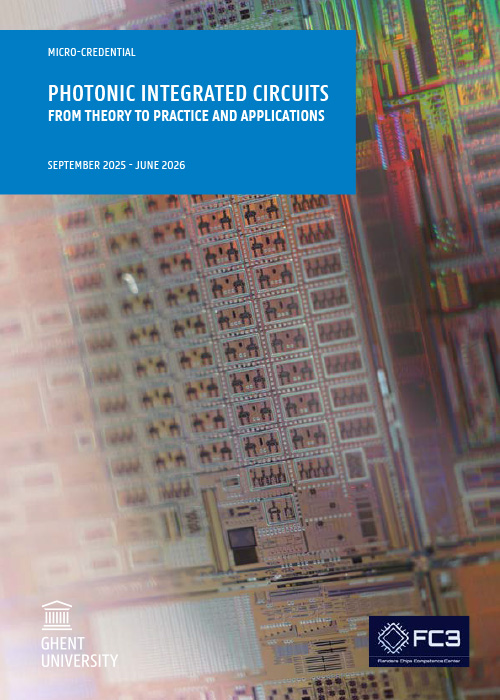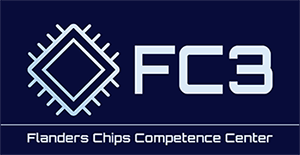Photonic Integrated Circuits: from theory to practice and applications
Micro-credential

September 2025 – June 2026
Driven by the current needs of data centers and artificial intelligence, the field of integrated photonics is growing rapidly, resulting in a shortage of skilled researchers and engineers. This micro-credential is designed to equip lifelong learners with the necessary skills and knowledge to make a difference in this cutting-edge field, from core technologies to diverse applications in telecommunications, data communications, sensors and biomedical technology, and quantum information processing.
Both simulation and modeling of chip design are covered, as well as insight into the necessary materials and fabrication techniques to ultimately characterize and measure a working photonic chip.

Several high-tech companies and research institutions in Flanders (and abroad) are increasingly seeking professionals with expertise in Photonic Integrated Circuits (PICs), also known as photonic chips. In this micro-credential, professionals will gain a solid foundation in the theory behind PICs, understand the practical aspects of design and fabrication, and explore real-world applications of photonic chips. The course empowers learners to contribute to the next generation of miniaturized, scalable photonic systems, and to play a role in the growing European photonics ecosystem.
This course is also a great fit for business development professionals looking to grasp the value of Photonic Integrated Circuits and capitalize on the dynamic market opportunities emerging in this field.
Participants must have at least a bachelor’s degree ‘Bachelor of Science in industrial engineering’ or ‘Bachelor of Science in Engineering’ .
The language of instruction is English, which requires a sufficient command of the English language.
Micro-credentials are small courses of academic level that focus on specific competencies. They often consist of one or several subjects which are also taught in an university bachelor's or master's degree.
If you pass the micro-credential, you will receive a certificate as proof that you have completed the acquired competencies. So you also acquire real official credits who are recognized in your further career, also internationally. They can also lead to exemptions for other courses, also at other institutions and organizations.
You will receive a certificate of the micro-credential + credit certificate when you pass the corresponding exam (8 ECTS points).
Examination method
- There is closed book exam with a written and oral part.
- There is a continuous evaluation of the design project and the lab exercises
- Calculation of the examination mark: 30% written exam, 20% oral exam, 30% design project and 20% lab exercises.
Prof. Wim Bogaerts, Department of Information Technology, Ghent University-imec
dr. Mattias Verstuyft, Department of Information Technology, Ghent University-imec
Contents
The course encompasses the entire spectrum of PIC development, covering design, fabrication, testing, and characterization. So, next to the theoretical background, the students will actively design their own PIC which will be fabricated and later on in the course tested and characterized. Additionally, it includes special lectures delivered by industry experts, shedding light on major application areas, and includes company visits to get familiar with the ecosystem and allows for networking opportunities.The course will cover the following aspects:
- Introduction : PICs and Silicon Photonics
- Quickstart: Photonic Circuit Design + info of the design project
- Waveguides and PIC platforms
- PIC components: passive and active building blocks
- PIC fabrication processes and relation to the CMOS process flow
- Heterogeneous integration for silicon photonics
- Circuit abstraction? Why?
- Ways to describe photonic circuits? Signals, ports, models
- Time domain/frequency domain circuit simulation
- Circuit Design Flow and Chip Layout
- Wavelength Filter Circuits
- Component Simulation and Component Simulation Quiz
- Programmable Photonics
- Co-integration techniques, Co-design and co-simulation considerations
- Control loops
- Design for Manufacturability
- Hands-on characterization labs
- Packaging for PICs
- Applications
- Company visits
Final competences
- Understanding of the working principles of PIC components (active and passive), and how they can be combined into circuits
- Understanding the essential modelling and simulation techniques for PICs components and circuits, being able to select the most suitable method for a problem, and applying the techniques (with commercial tools)
- Understanding photonic circuit formalisms, how they differ from electronic circuits. Being able to construct photonic circuits, simulate them, and generate a layout that can be fabricated.
- Understanding the fundamental concepts of wavelength filters, and the different implementations with their strengths and weaknesses.
- An insight into the different technology platforms for PICs, their fabrication processes, and how PICs can serve a diversity of applications.
- Having hands-on experience in designing a photonic integrated circuit with tunable elements, the associated fabrication and packaging flow, and being able to characterize the chip using lab equipment and driver electronics.
- An insight in the PIC Ecosystem of Ghent, Leuven and Eindhoven (and beyond)
- Connecting with stakeholders
Practical info
Fee
2.600 euro
Course material is at the learning platform Ufora.
Click here for more information about the billing process and the payment request.
SME portfolio
Ghent University accepts payments via the SME portfolio (www.kmo-portfolio.be; use authorization code DV.O103193).Opleidingsverlof (VOV)
This training is recognized in the context of VOV (ODB-P00004). For each credit point you are entitled to 4 hours of VOV.This course (8 ECTS points) covers in total 32 hours of VOV (participation in the assignments and the exam is mandatory).
The registration certificate for VOV can be found at your personal page in OASIS (student administration platform).
You can download this yourself via OASIS. For administrative reasons, it's helpful to write the registration number ODB-P00004 on the certificate yourself. Certification of exam participation is done automatically.
Classes start on Friday September 26 2025. During the first semester, the classes take place weekly on Fridays from 13h to 16h in Lecture room 0.1 in the iGent building, UGent Tech Lane Science Park building 126, Campus Ardoyen, Ghent-Zwijnaarde. In the second semester the classes will take place on Mondays from 13h to 16h on the UGent Tech Lane Science Park. The last session will be given on the 11th of May 2026. More info on the UGent academic calendar The company visits will be scheduled during the second semester, next to the Ghent Photonics ecosystem, a company visit to imec is foreseen. Optionally, students can also engage in the visit to PhotonDelta-TU/e (Technical University of Eindhoven) visit. Participants take the classes together with the students of the Advanced Master of Silicon Photonics. The training is supported by the Ufora learning platform, which contains, among other things, the course material.
Laptop
A personal laptop is required.Organisation
Questions about the content can be asked to siliconphotonics@ugent.beUniversiteit Gent
UGent Academie voor Ingenieurs
Technologiepark 60
9052 Zwijnaarde
Tel.: +32 9 264 55 82
ugain@UGent.be